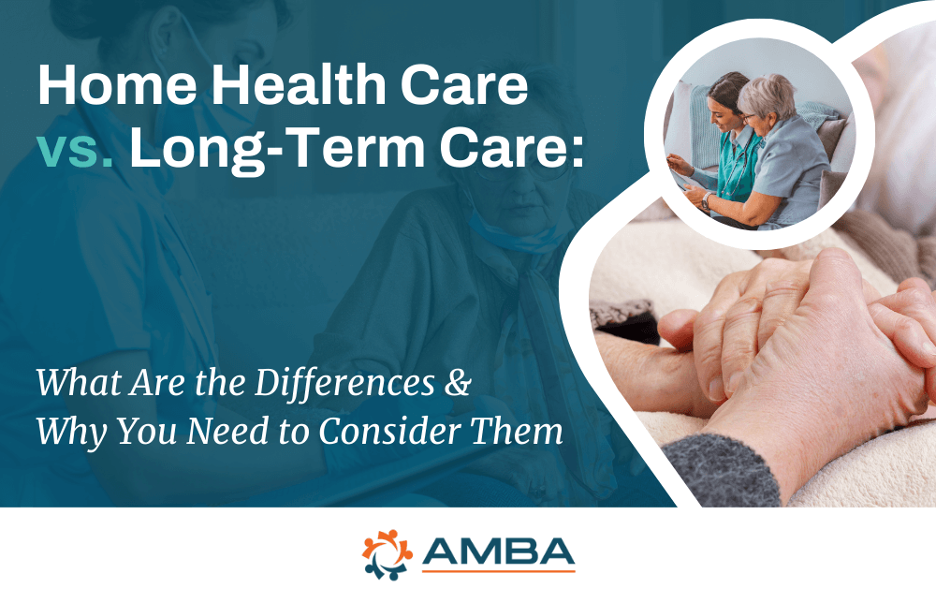
Home Health Care vs. Long-Term Care: What Are the Differences & Why You Need to Consider Them
by RSEA TX | February 1, 2024
Weighing your options to protect you and your loved one’s financial future as you get older? Investing in a Home Health Care and/or Long-Term Care plan from your association's trusted partner AMBA could be the most important investment you ever make.
AMBA has decades of experience providing high-quality coverage at reasonable rates so you can have peace of mind and the assurance that you have the policies you and your loved ones need. AMBA's Home Health Care and Long-Term Care plans ensure you get the appropriate medical assistance necessary for your needs. Plus these plans help protect your life’s savings, in the environment best for your circumstances and preferences. After all, although you can’t predict what your health or medical needs will be as you continue to age, the fact of the matter is that the expense of medical assistance continues to rise. You need to be prepared.
What is Home Health Care?
As the name suggests, Home Health Care (HHC) is temporary medical care in the convenience and comfort of a patient's home after surgery, injury, or illness. Home Health Care lets the patient have the recovery time their doctor recommends and can help prevent potential readmission to the hospital. Recovering at home can cost less and be just as effective as care in a hospital or skilled nursing facility.
Home Health Care is goal-oriented, to get the patient back on their feet (sometimes literally!). Caregivers may assist patients with different types of physical therapy to help them relieve pain and restore movement. Caregivers may also assist with a patient’s occupational therapy, which helps equip the patient with the skills they need to care for themselves.
Home health aides and professional caregivers may assist patients with their personal care and hygiene during this time. They may also work with nurses and other medical professionals to help manage medical conditions, such as changing wound dressings or monitoring vital signs.
The caregiver will likely stay with the patient temporarily, perhaps for a matter of weeks or months.
While many people assume that Home Health Care is primarily for younger patients, many older people may also only need help for a limited amount of time. Home Health Care might be suitable for an older person following a surgery that requires rehab, such as a hip replacement. It may also be used by older patients while they recover from an injury or major illness.
What is Long-Term Care?
While Home Health Care focuses on achieving an end goal, the aims of Long-Term Care are most often focused on providing comfort and safety. Long-Term Care is medical aid and caregiving assistance provided to a patient with no end date. A patient with ongoing health needs, a disability, or a degenerative condition may need the services of a home health aide or caregiver for the rest of their life.
Long-Term Caregivers can help provide a patient and their families with important peace of mind, knowing that a professional is there to give necessary medical assistance and respond to emergencies.
Caregivers and health aides are often very involved in a patient’s day-to-day needs when providing Long-Term Care. They may assist with medical care or delivering medications, as well as help with a patient’s personal care, hygiene, and mobility. Additionally, the caregiver may also do some light housework, help prepare meals, run errands, and accompany the patient to doctor’s appointments.
Depending on a patient’s age and condition, they might require assistance for many years.
Long-Term Care is often assumed to be a service only for the elderly. However, younger patients with a chronic illness or disability may also need long-term care services.
Be Prepared for the Future
The sooner you plan, the better your chances of avoiding financial challenges later. Even today, the expense of Long-Term Care can be a staggering $75,000 a year or more. Consider getting the Home Health Care and Long-Term Care plans from your association and AMBA. AMBA's Home Health Care plan coverage is paid directly to you or a medical provider that you designate. Plus, your benefits are given in addition to any other healthcare coverage you may have! You deserve to have access to the help you need. Learn more by calling AMBA at 866-615-4063 or request a free Benefits Review with a knowledgeable AMBA agent.
RECENT POSTS

The Top Scams to Watch Out for in 2025
In our increasingly digital world, the top scams continue to evolve, with fraudsters developing new and sophisticated ways to
Read More
There’s More Connection Between Your Vision and Heart Health Than Meets the Eye
We all remember the song “Dem Bones,” with lyrics like “The hip bone's connected to the backbone.”
Read More

Fall in Love with a World of Savings This Valentine’s with AMBA Passport
Here’s some fun trivia about Valentine’s Day: it’s believed that Geoffrey Chaucer invented
Read More

How Often Should Older Adults Go to the Dentist?
The eyes may be the gateway to your soul, but oral health is a window into overall health. When it comes to your teeth and
Read More

